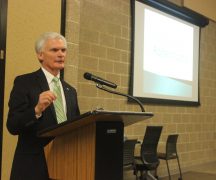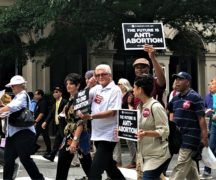By JAN LARSON McLAUGHLIN
BG Independent News
Wood County’s legislators split on the “heartbeat bill” that now sits on the desk of Ohio’s governor.
If signed by Gov. John Kasich, the bill would become one of the strictest abortion laws in the nation.
State Sen. Randy Gardner voted for the bill, while State Rep. Theresa Gavarone bucked the majority in the party and voted against it. Both legislators are Republicans from Bowling Green.
The bill would ban abortions once a fetal heartbeat can be detected. That could be as early as six weeks into the pregnancy – before some women are even aware they are expecting. The ban would make an exception if the mother’s life is in danger – but not in cases of rape or incest.
The “heartbeat bill” has been tried before in Ohio, but prior to this week failed to get past the state senate. However, State Senate President Keith Faber, a Republican, said the twice-defeated bill came back up again because of Donald Trump’s presidential victory and the expectation he will fill Supreme Court vacancies with justices favoring stricter abortion bans.
The abortion restrictions were tacked onto an unrelated bill about child abuse and neglect. The bill, with the “heartbeat” portion, passed the Senate by a vote of 21 to 10.
“I respect this is a difficult issue for many people,” Gardner said on Wednesday. “For those who believe the unborn with beating hearts are indeed children, the bill’s intention is to defend innocent human life.”
Gardner added that most of the comments received in his office on the bill have been in favor of the legislation. “The vast majority of emails, letters and phone calls to my office on this issue have been in support of the bill,” he said.
The bill passed in the Ohio House by a vote of 56 to 39. Seven Republican representatives broke with the party and voted against the bill. Gavarone was one of those to vote “no.”
On Thursday morning, Gavarone said she voted against the “heartbeat bill” because it does not allow for exceptions in cases of rape or incest. “That was an important consideration for me,” she said.
Under the U.S. Supreme Court’s 1973 Roe v. Wade ruling establishing a nationwide right to abortion, states were permitted to restrict abortions after viability — the point when the fetus has a reasonable chance of surviving under normal conditions outside the uterus. The ruling offered no legal definition of viability, saying it could range between 24 and 28 weeks into a pregnancy.
Ohio’s “heartbeat bill” breaks from that Supreme Court ruling.
“Politicians in the Ohio State Legislature just passed one of the most extreme abortion bans in the entire country,” said Dawn Laguens, executive vice president of Planned Parenthood Action Fund. “After years of passing anti-abortion laws under the guise of protecting women’s health and safety, they lay bare their true motives: to ban abortion in the state of Ohio.”
According to Planned Parenthood, during Kasich’s time as governor, state policies have had the following impacts:
- Nearly half the abortion providers in the state have shuttered.
- Ohio put a gag order on rape crisis counselors that prohibited them from telling women they had the option to access abortion services.
- The state of Ohio tried to block patients from care at Planned Parenthood health centers.
“Politicians have no right to dictate Ohio women’s personal medical decisions,” Laguens said. “Make no mistake –– these bills punish women. We’ve already seen how restrictions force women to travel hundreds of miles and cross state lines, which many women with low incomes cannot afford to do.”
Kasich, an abortion opponent, has previously voiced concerns about whether such a restrictive law would be constitutional. He has 10 days to act on the bill and as of Wednesday had not said whether he plans to sign the measure.
Similar measures elsewhere have faced legal challenges, and critics in Ohio have warned such legislation will lead to a costly fight in the courts. Opponents predict it will be found unconstitutional if it becomes law.





